complete h file cpp file is complete and an output is give
/**************************************************************************
* complete .h file (.cpp file is complete) and an output is given *
**************************************************************************/
implement a generic dynamic array class. It will be atemplated class that provides the basic features of an array.
/********************************************************************
* output: bold one\'s are the one\'s I didn\'t know how to do *
********************************************************************/
The correct output is shown below:
The capacity of D is 15
The capacity of E is 15
The capacity of D is now 25
The capacity of E is now 30
D[0] = 11
Array index is negative
Array index is too large
/************************
* .cpp complete file *
*************************/
#include <string>
int doubleIt(dynarr<int> A)
{
int newsize = 2*A.getCapacity();
A.reserve(newsize);
return newsize;
}
int main()
{
dynarr<int> D(15);
std::cout << \"The capacity of D is \" << D.getCapacity() << std::endl;
dynarr<int> E(D);
std::cout << \"The capacity of E is \" << E.getCapacity() << std::endl;
D.reserve(25);
std::cout << \"The capacity of D is now \" << D.getCapacity() << std::endl;
E.reserve(2*E.getCapacity());
std::cout << \"The capacity of E is now \" << E.getCapacity() << std::endl;
D[0] = 11;
std::cout << \"D[0] = \" << D[0] << std::endl;
try {
std::cout << D[-1] << std::endl;
}
catch(InvalidIndex &ex) {
std::cout << ex.getMessage() << std::endl;
}
try {
std::cout << D[30] << std::endl;
}
catch(InvalidIndex &ex) {
std::cout << ex.getMessage() << std::endl;
}
return 0;
}
/************************************
* .h file (should be completed) *
*************************************/
#include <cassert>
#include <iostream>
#include <string>
class RuntimeException // generic run-time exception
{
protected:
std::string errorMsg;
public:
RuntimeException(const std::string& err) { errorMsg = err; }
std::string getMessage() const { return errorMsg; }
};
class InvalidIndex : public RuntimeException
{
public:
InvalidIndex(const std::string& err): RuntimeException(err) {};
};
template <class dynElem>
class dynarr {
private:
int capacity;
dynElem *A;
public:
dynarr() : capacity(0), A(NULL){}
dynarr(int N): capacity(N), A(new dynElem[N]){}
dynarr(const dynarr<dynElem> &other);
~dynarr();
dynarr<dynElem> & operator=( const dynarr<dynElem> &other);
dynElem & operator[](int ndx) throw(InvalidIndex);
int getCapacity();
void reserve(int newcap);
};
template <class dynElem>
dynarr<dynElem>::dynarr(const dynarr<dynElem> &other)
{
capacity = other.capacity;
A = new dynElem[capacity];
for(int i = 0; i < capacity; i++)
A[i] = other.A[i];
}
template <class dynElem>
dynarr<dynElem>::~dynarr()
{
}
template <class dynElem>
dynarr<dynElem> & dynarr<dynElem>::operator=( const dynarr<dynElem> &other)
{
dynarr temp (other);
return temp;
}
template <class dynElem>
dynElem & dynarr<dynElem>::operator[](int ndx) throw(InvalidIndex)
{
//if(ndx < capacity)
return A[ndx];
/*else if(ndx < 0)
std::cout<<\"Array index is negative\"<<std::endl;
else
std::cout<<\"Array index is too large\"<<std::endl; */
}
template <class dynElem>
int dynarr<dynElem>::getCapacity()
{
return capacity;
}
template <class dynElem>
void dynarr<dynElem>::reserve(int newcap)
{
// if newcap <= capacity, does nothing;
if(newcap > capacity)
{
// if capacity is 0, allocates a dynamic array of
// capacity newcap and makes A point to that array;
if(capacity == 0)
A = new dynElem[newcap];
// otherwise allocates a new dynamic array newA of capacity
// newcap, copies values in A to newA, deletes A and sets
// A equal to newA
else
{
dynElem *newA = new dynElem[newcap];
for(int i = 0; i < capacity; i++)
newA[i] = A[i];
delete A;
A = newA;
capacity = newcap;
}
}
}
Solution
The following the code for only .h file where the exception throwing is handled for negative and overlfown indexes
PROGRAM CODE:
#include <cassert>
#include <iostream>
#include <string>
class RuntimeException // generic run-time exception
{
protected:
std::string errorMsg;
public:
RuntimeException(const std::string& err) { errorMsg = err; }
std::string getMessage() const { return errorMsg; }
};
class InvalidIndex : public RuntimeException
{
public:
InvalidIndex(const std::string& err): RuntimeException(err) {};
};
template <class dynElem>
class dynarr {
private:
int capacity;
dynElem *A;
public:
dynarr() : capacity(0), A(NULL){}
dynarr(int N): capacity(N), A(new dynElem[N]){}
dynarr(const dynarr<dynElem> &other);
~dynarr();
dynarr<dynElem> & operator=( const dynarr<dynElem> &other);
dynElem & operator[](int ndx) throw(InvalidIndex);
int getCapacity();
void reserve(int newcap);
};
template <class dynElem>
dynarr<dynElem>::dynarr(const dynarr<dynElem> &other)
{
capacity = other.capacity;
A = new dynElem[capacity];
for(int i = 0; i < capacity; i++)
A[i] = other.A[i];
}
template <class dynElem>
dynarr<dynElem>::~dynarr()
{
delete A;
}
template <class dynElem>
dynarr<dynElem> & dynarr<dynElem>::operator=( const dynarr<dynElem> &other)
{
dynarr temp (other);
return temp;
}
template <class dynElem>
dynElem & dynarr<dynElem>::operator[](int ndx) throw(InvalidIndex)
{
if(ndx < 0)
throw InvalidIndex(\"Array Index is negative\") ;
else if(ndx < capacity)
return A[ndx];
else if(ndx > capacity)
throw InvalidIndex(\"Array index is too large\");
}
template <class dynElem>
int dynarr<dynElem>::getCapacity()
{
return capacity;
}
template <class dynElem>
void dynarr<dynElem>::reserve(int newcap)
{
// if newcap <= capacity, does nothing;
if(newcap > capacity)
{
// if capacity is 0, allocates a dynamic array of
// capacity newcap and makes A point to that array;
if(capacity == 0)
A = new dynElem[newcap];
// otherwise allocates a new dynamic array newA of capacity
// newcap, copies values in A to newA, deletes A and sets
// A equal to newA
else
{
dynElem *newA = new dynElem[newcap];
for(int i = 0; i < capacity; i++)
newA[i] = A[i];
delete A;
A = newA;
capacity = newcap;
}
}
}
OUTPUT:
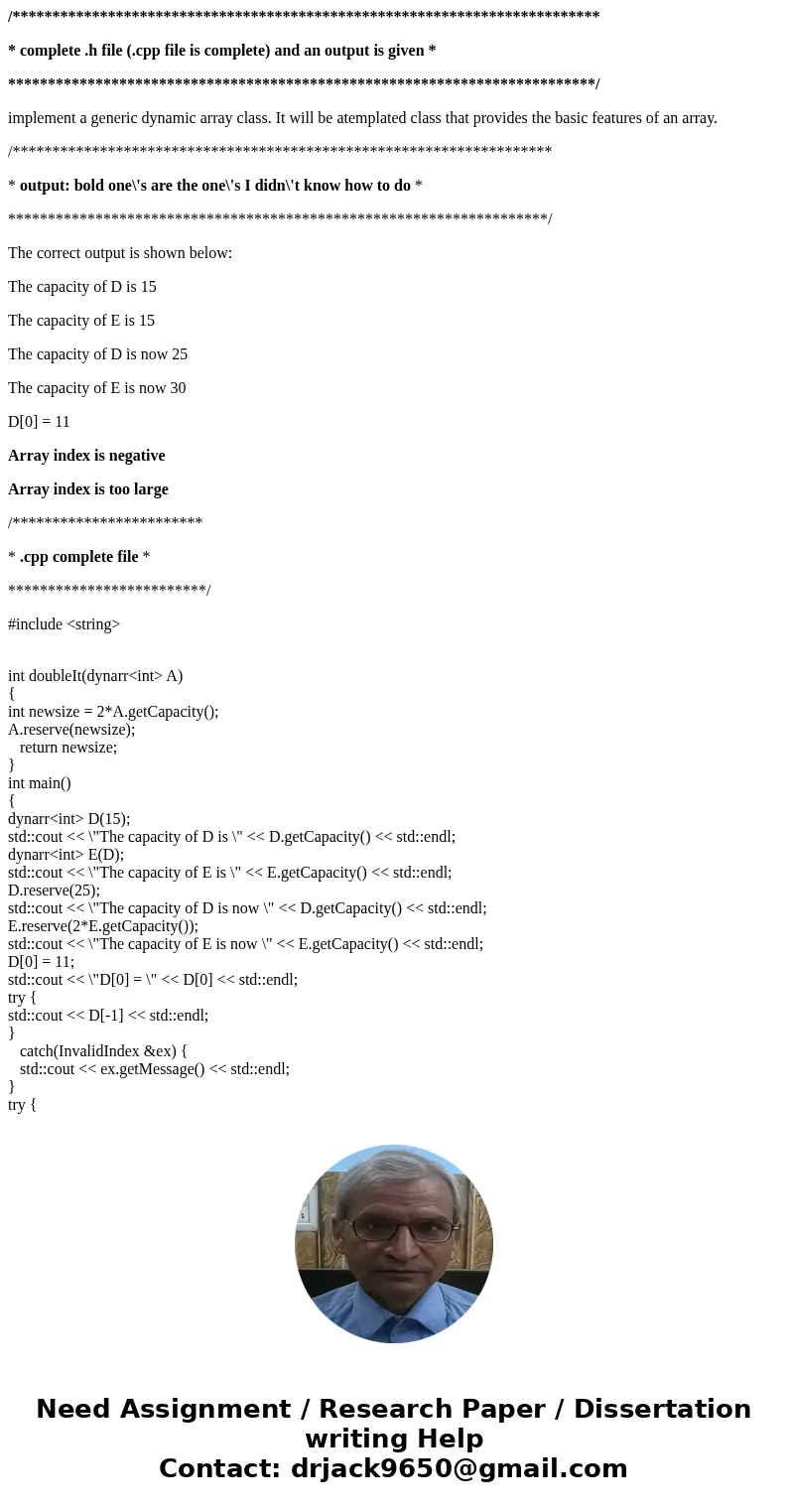
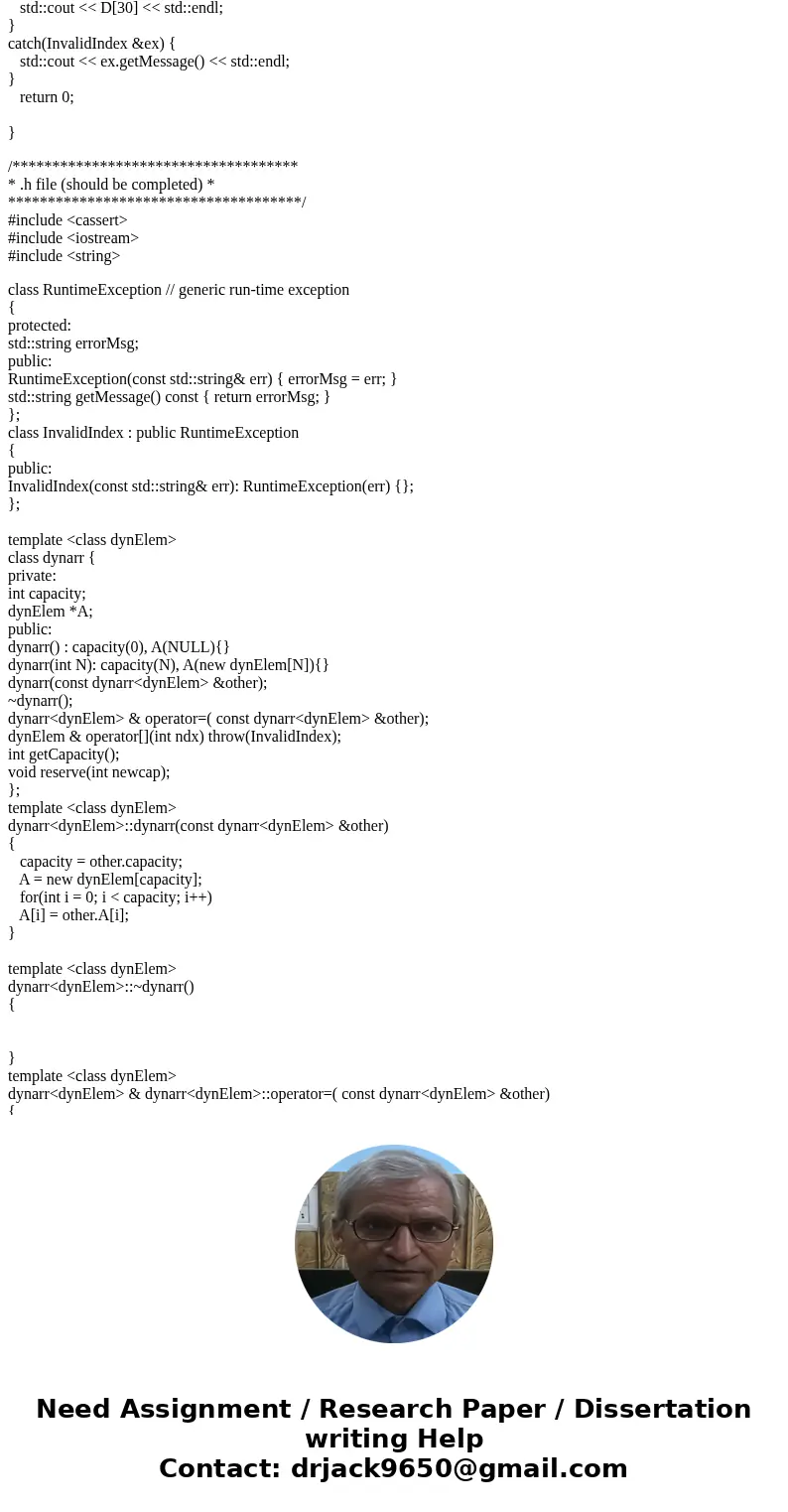
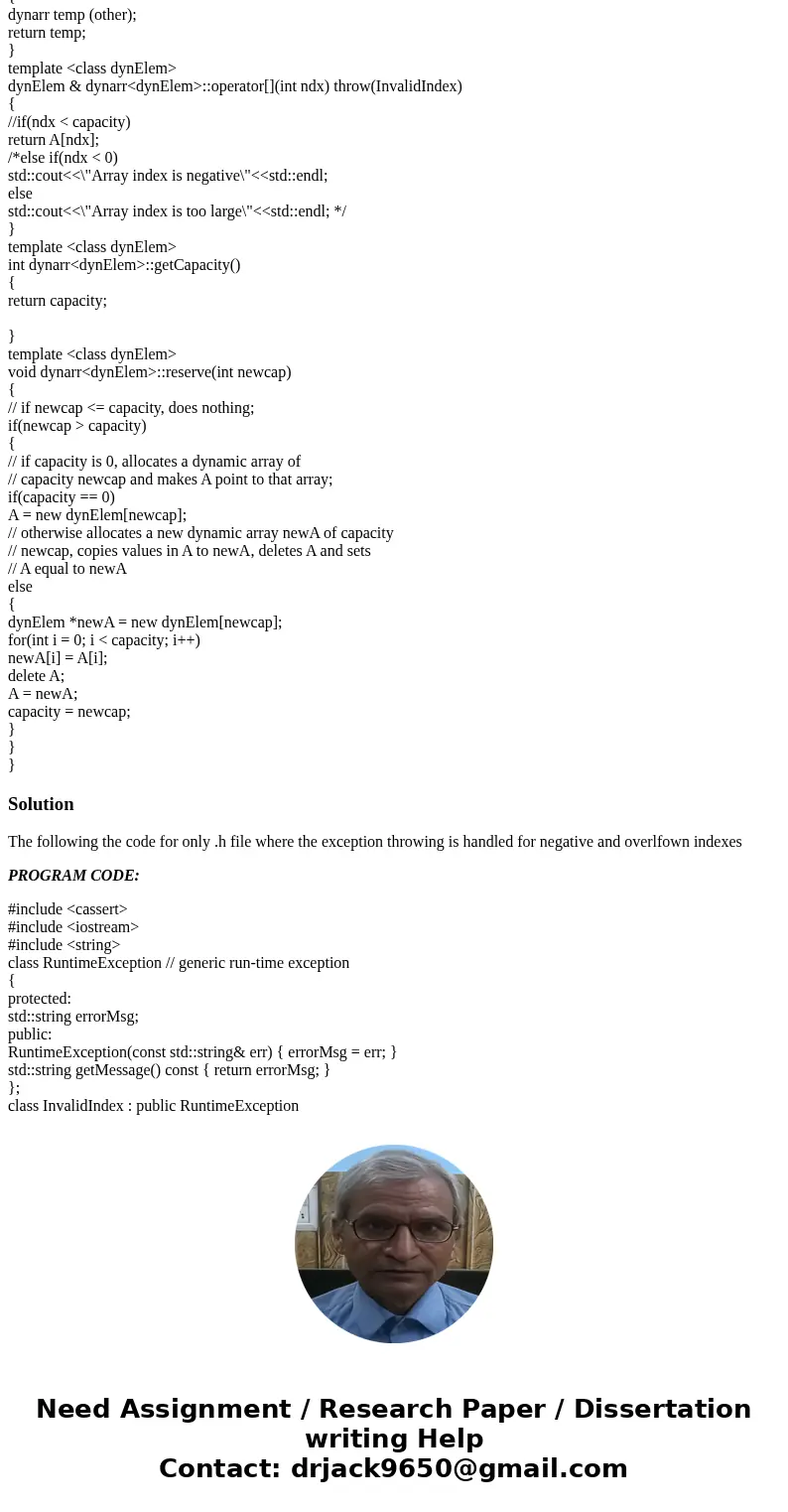
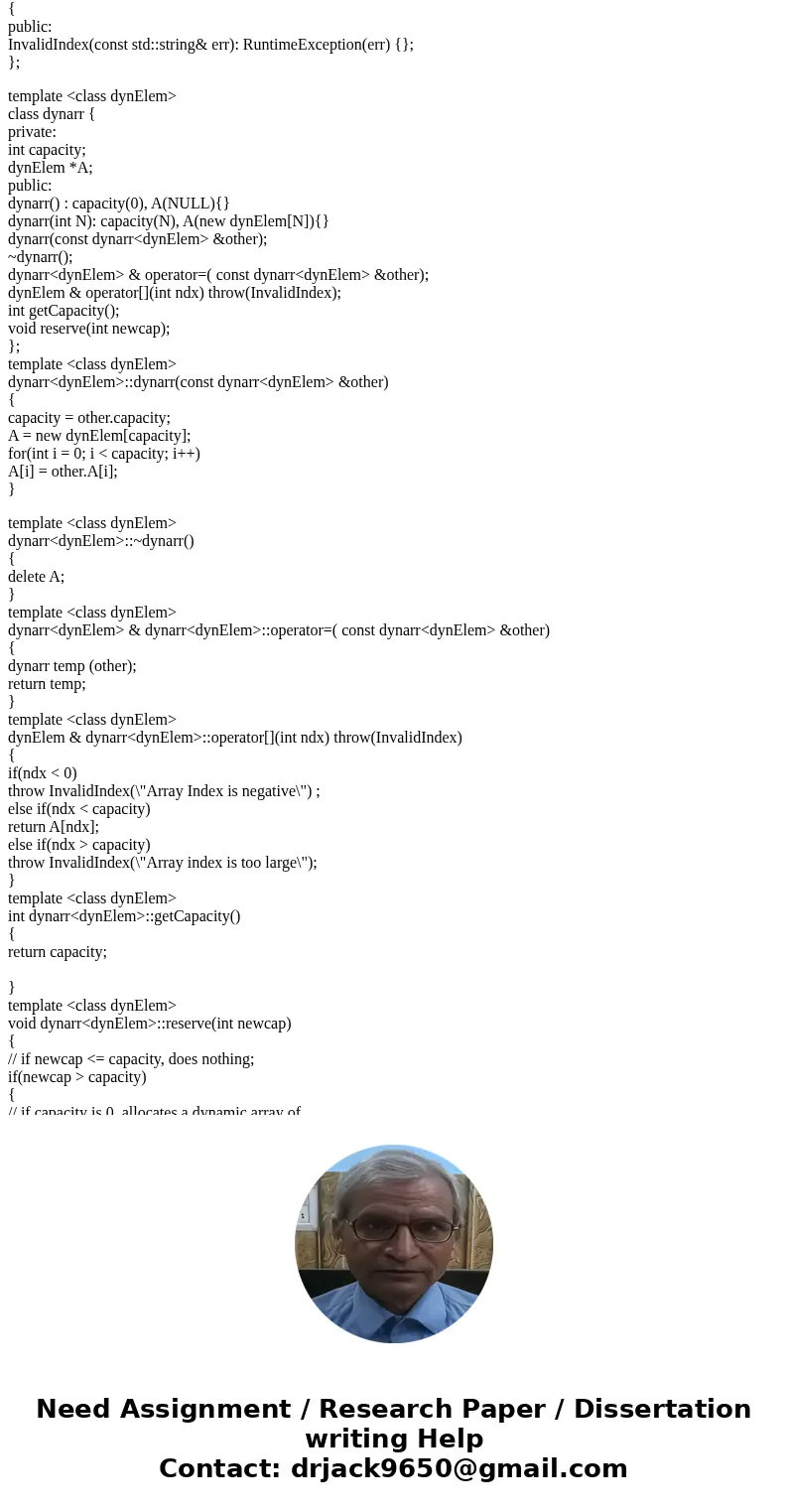
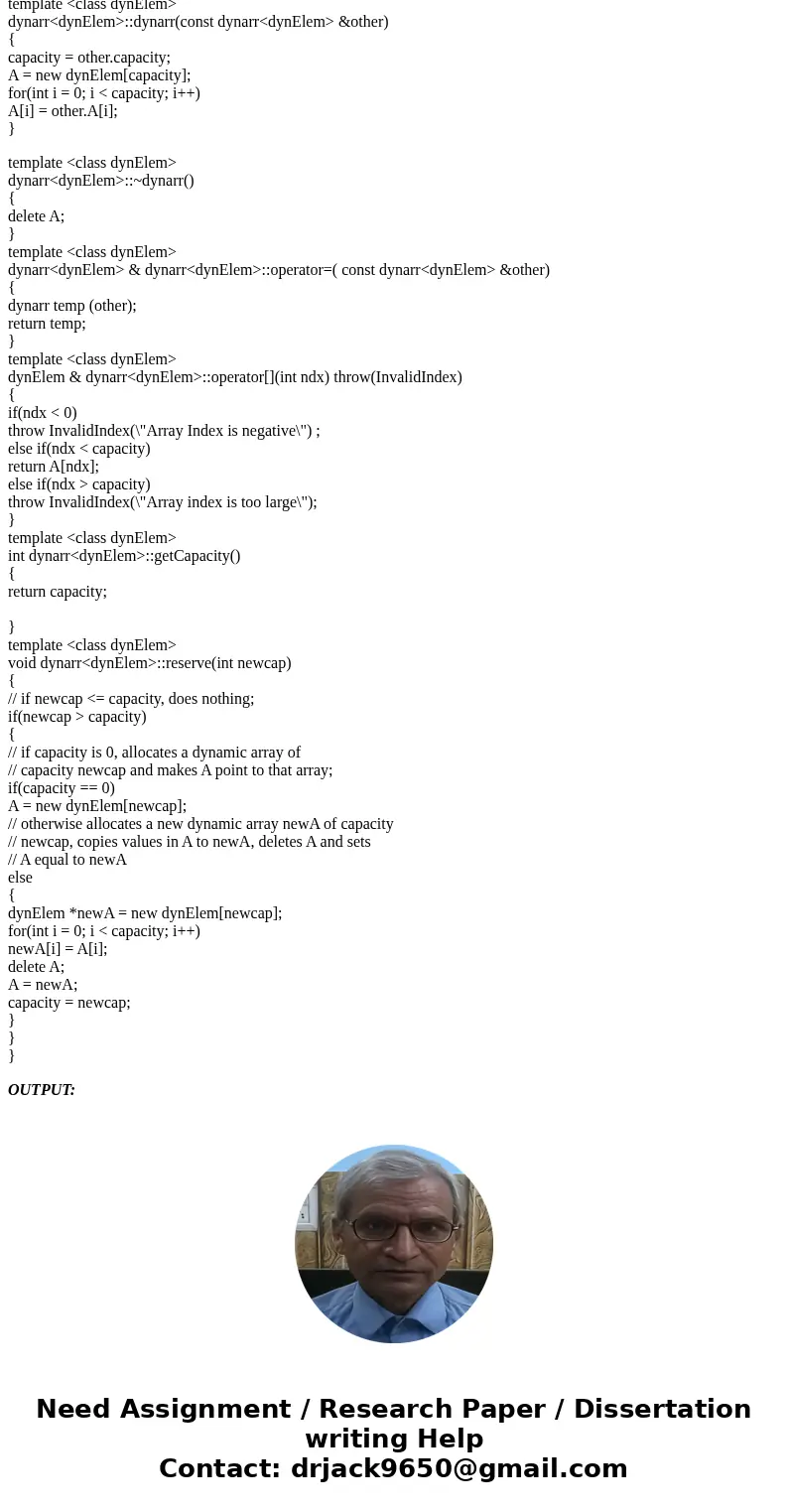
 Homework Sourse
Homework Sourse